Safeguard Orders
You are facing an urgent family crisis and you are wondering how you can urgently get a judgment from the court?
You are already involved in a divorce case or a family law case and you need the immediate assistance from the court for an urgent matter relating to your children?
You’ve heard of safeguard orders and you wonder what that is and how can it be suitable for you?
Well, you are reading the perfect article!
In this article, we will break down the safeguard order procedures in a simple and easy to understand way.
Are you ready?
Let’s get straight to it.
In this article we will look at the following:
- What is a safeguard order?
- What are the conditions needed to succeed with a safeguard order?
- Is a safeguard order the same as an interim order?
- What matters can a court resolve through a safeguard order?
- Can you request more than one safeguard order?
- How long does it take for the court to hear a safeguard order?
- Can I see a judge within a few days if I have a family urgency and need a safeguard order?
- What is the applicable rule of evidence for safeguard orders?
- For how long is a safeguard judgment good for?
- Conclusion on safeguard orders
1- What is a safeguard order?
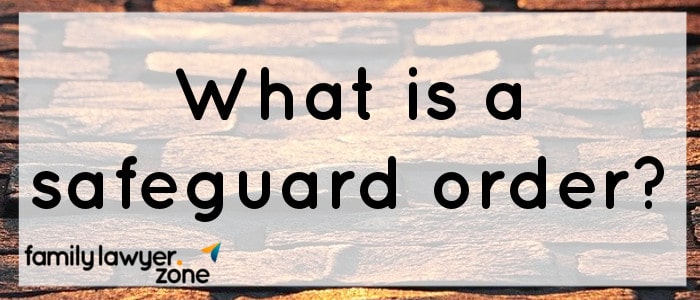
A safeguard order is a judgment rendered by the court dealing with a highly urgent matter that without it an irreparable damage could be caused to the parties or family members such that a judgment at a later point in time could no longer remedy.
That was quite a mouthful!
How do we say that in plain English?
Ok, here we go.
Urgency and irreparable harm
For the court to render a safeguard order, or an urgent judgment, you must show to the court that if they don’t render a judgment immediately, you could no longer recover from it at a later point in time.
This will make more sense if we look at an example.
Example of Safeguard Order
Imagine that you are in dispute with your spouse and you just heard that your spouse intends to take the children out of school to move to another city.
What do you do immediately to prevent this from happening in the next few days?
The safeguard order route is the option that you should immediately pursue.
You can file a safeguard order and be heard very quickly by the court.
In this example, your demand will most likely be one to prevent the other parent from removing the children from school and taking them out of town.
Evidently, if the court does not render a judgment now and your spouse leaves with the children, then a judgment at a later point would not be able to remedy the harm to your children as they are already gone.
Although we don’t hope this for anyone, this example serves to show how a safeguard can be leveraged in a case of emergency.
2- What are the conditions needed to succeed with a safeguard order?
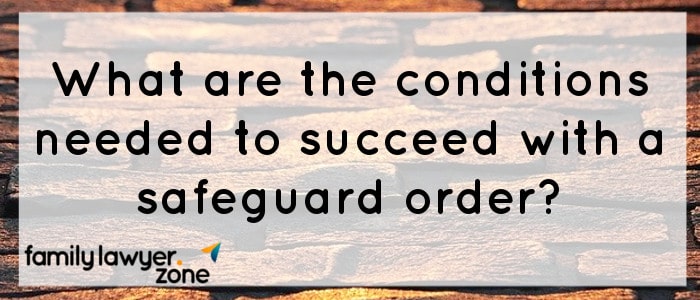
To succeed with a safeguard order, you must demonstrate the urgency whereby if the court does not immediately render a judgment, any further judgments will no longer be able to remedy the problem.
The conditions needed to succeed in a safeguard order are typically to show the urgency, an irreparable harm and an apparent right to make the demand that you are making.
In Quebec, when you are dealing with a recourse under the Civil Code of Quebec or the Divorce Act, we see quite often safeguard orders are requested in dealing with custody, access rights, child support, parental authority and spousal support.
Any form of alimentary demands or matters dealing with the parental authority relating to the well-being, progress and security of a minor child that is urgent will more likely be accepted by the court to be heard in the context of a safeguard order.
Let’s look at a child support request at the safeguard order level.
The case is urgent as child support is needed for the basic survival needs of a child, if the child support is not paid, then it can cause an irreparable harm to the child and finally the parent asking for the child support has a clear right in making such a demand being the custodian of the child.
3- Is a safeguard order the same as an interim order?
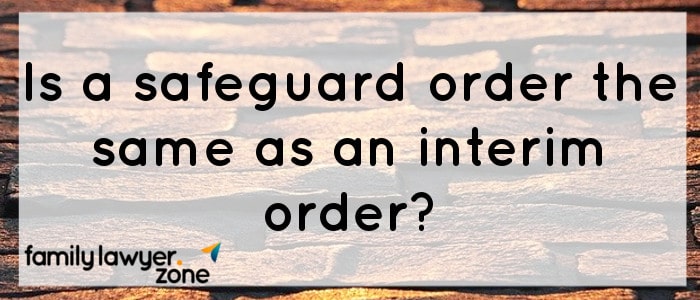
A “safeguard order” is used interchangeably with “interim order”.
We say “interim” order as an indication that this order, or judgment, is rendered for a temporary period of time.
Some may also refer to this safeguard order as a “temporary order” which means exactly what it says, a temporary judgment.
At the end of the day, a “safeguard order”, an “interim order” or a “temporary order” are all referring to the same legal vehicle which is to obtain an immediate and urgent judgment from the court.
4- What matters can a court resolve through a safeguard order?
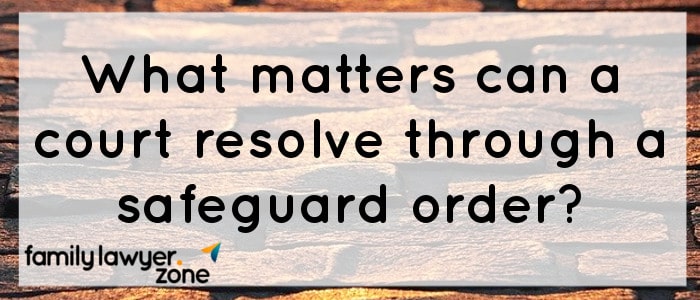
In family law cases in Quebec, married couples, civil union couples and de facto couples or common-law couples can ask for a safeguard order to resolve urgent family matters such as:
- Child custody disputes
- Access rights disputes
- Parental authority disputes
- Parenting arrangements
- Use of family residence
- Removal of a child
- Child support and special expense disputes
- Spousal support and compensation disputes
These requests can be made by way of a safeguard order whether your case is based upon the Civil Code of Quebec or the Divorce Act so long as there is an urgency and a possibility of irreparable harm.
If you have an urgent matter requiring you to seek immediate remedy from the court, you are encouraged to speak to a family lawyer on safeguard orders who can guide you through the process and assess whether or not a safeguard order can be suitable.
Most of the time, the urgency is such that there is not a lot of time to lose and so your lawyer can very quickly bring your case in front of a judge within a matter of days.
5- Can you request more than one safeguard order?

There is no set rule on how many safeguard orders a court may award in a case.
As a result, a case may have more than one safeguard order depending on the level of dispute between the separating couple.
For example, in the beginning of your family law case you could ask for child support to be paid on an interim basis as the other parent is not paying for your child’s expenses.
Then, shortly thereafter, you find out the other parent intends to travel with the children to a dangerous country and you disapprove.
You will potentially need to get another safeguard order to resolve this matter as well.
6- How long does it take for the court to hear a safeguard order?
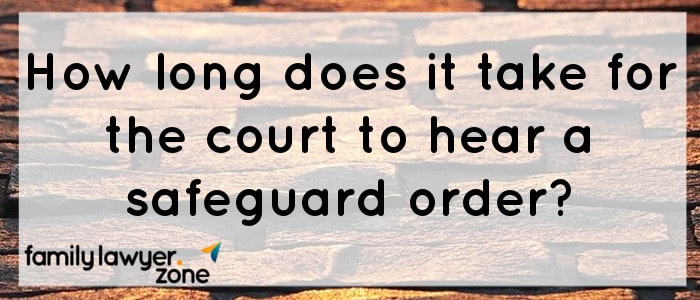
The general rule is that a safeguard order can be presented to a judge by giving the other party a notice of ten (10) days.
This means that when you prepare your safeguard order, you will serve the defendant or the other party a copy of your motion, and you give him or her a notice that your motion will be presented before a judge at a date no less than ten days of the date he or she receives a copy of your motion.
The law requires that you give a standard ten days so that the defendant or the other party has enough time to prepare a response to your motion and see how he or she will defend it.
7- Can I see a judge within a few days if I have a family urgency and need a safeguard order?

The law in Quebec requires that you give the other party at least ten days before you can present a motion for safeguard order to the court.
However, in some very very urgent matters where the ten days could be a detrimental delay, then you can ask for the court to hear your case but you must convince the court that the urgency is so grave that waiting the legally standard ten days is not feasible.
This is commonly referred to as “asking the court for the abridgment of the notice delays”.
This is what is usually referred to as presenting a “double urgency” evidence.
In other words, you must present the urgency to justify that you do not give the standard ten days to the other party before a judge makes a decision, then you must prove the urgency justifying the court to award you a safeguard order if the case is heard.
8- What is the applicable rule of evidence for safeguard orders?
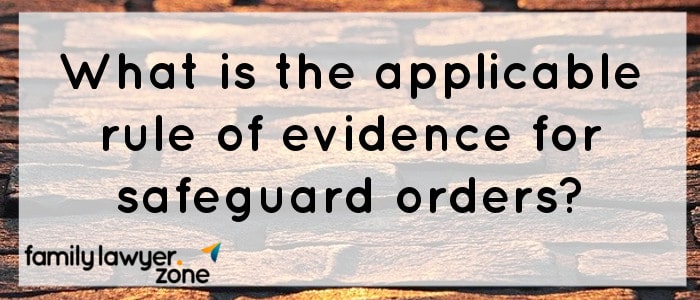
In the province of Quebec, when dealing with a safeguard order, the primary form of evidence is presented through the documentation that you will submit to the judge along with a written affidavit.
The courts will not render a judgment based on witnesses giving live testimonies but rather the witness testimonies must be presented in writing via a sworn statement or what used to be called an Affidavit.
The court, by just reading the sworn statements, seeing the exhibits and documents, of each party should already have all the information and facts necessary to render a judgment.
Your family lawyer can present a plea or give an oral explanation of your demands to the judge and this oral explanation must be based upon the facts submitted.
The courts will render judgments on safeguard orders on an expedited basis and so each case should not take for more than two hours to be read, pleaded and evaluated by the judge.
9- For how long is a safeguard judgment good for?
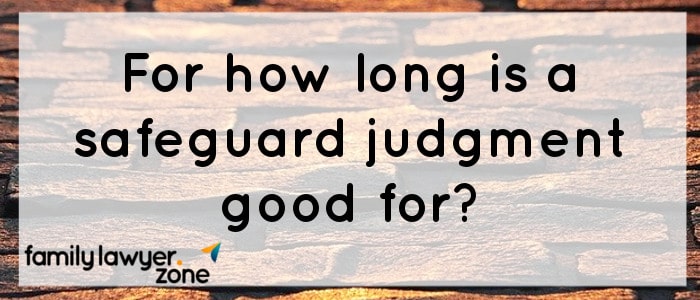
A safeguard order must have a very short life of no more than thirty (30) days approximately but may be extended or carried forward as needed by the parties.
The safeguard order is a mechanism that bridges the gap between an urgent situation and the next important hearing planned in your case timetable which is either a hearing on provisional measures or on the merits.
The hearing on provisional measures and the hearing on merits are “planned” trial dates and they are scheduled right from the inception of the legal proceedings.
Safeguard orders are not “planned” hearings but an unexpected or unplanned event that requires the court to render a judgment very quickly.
If, in the context of your court case, you still have not reached the trial on provisional measures, then the safeguard order will be good until the judgment on provisional measures is issued.
If you already have your judgment on provisional measures and the next planned trial date is the final hearing on the merits, then the safeguard order will be good until the final judgment is issued.
The above is a typical scenario but bear in mind that the judge has the power to set any timeline for the safeguard order.
If the judge says that the order is good for thirty days after which it will expire, then that will be the case.
In such cases, before the judgment expires, you will need to ask the court to extend the term if you believe that you need the judgment to be extended for more time.
These are strategies that should be reviewed and evaluated with your divorce lawyer or family lawyer as they will know what can be the best option for you based on the nature of your case.
10- Conclusion on safeguard orders

We hope that this article helped shed some light on what is a safeguard order, how it can be used and how it could be useful in the context of your family law case.
Whether we call it a safeguard order, interim order or temporary order, what we are referring to is a request to the court for the issuance of an immediate and urgent judgment dealing with a matter that must be remedied immediately if not irreparable harm can be suffered.
Considering the speed of execution and accuracy of your evidence is crucial to succeed in getting awarded a safeguard order, you are better off getting a consultation from a family lawyer or a divorce lawyer to guide you through the process or represent you in court.
At our law firm, our family lawyers work around the clock on family matters and can be your advisors in supporting you through this process.
You are welcome to contact us at any time for any legal advice or services in regards to a safeguard order in Quebec.
We wish you all the best in your family law journey.



